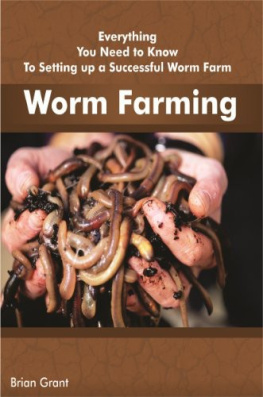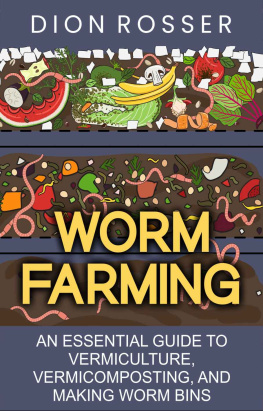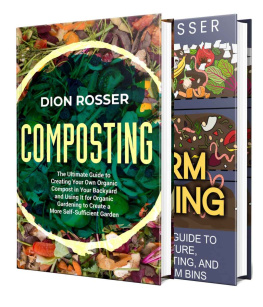Brian Grant - Worm Farming: Everything You Need to Know to Setting Up a Successful Worm Farm
Here you can read online Brian Grant - Worm Farming: Everything You Need to Know to Setting Up a Successful Worm Farm full text of the book (entire story) in english for free. Download pdf and epub, get meaning, cover and reviews about this ebook. year: 2014, genre: Children. Description of the work, (preface) as well as reviews are available. Best literature library LitArk.com created for fans of good reading and offers a wide selection of genres:
Romance novel
Science fiction
Adventure
Detective
Science
History
Home and family
Prose
Art
Politics
Computer
Non-fiction
Religion
Business
Children
Humor
Choose a favorite category and find really read worthwhile books. Enjoy immersion in the world of imagination, feel the emotions of the characters or learn something new for yourself, make an fascinating discovery.
- Book:Worm Farming: Everything You Need to Know to Setting Up a Successful Worm Farm
- Author:
- Genre:
- Year:2014
- Rating:3 / 5
- Favourites:Add to favourites
- Your mark:
- 60
- 1
- 2
- 3
- 4
- 5
Worm Farming: Everything You Need to Know to Setting Up a Successful Worm Farm: summary, description and annotation
We offer to read an annotation, description, summary or preface (depends on what the author of the book "Worm Farming: Everything You Need to Know to Setting Up a Successful Worm Farm" wrote himself). If you haven't found the necessary information about the book — write in the comments, we will try to find it.
Brian Grant: author's other books
Who wrote Worm Farming: Everything You Need to Know to Setting Up a Successful Worm Farm? Find out the surname, the name of the author of the book and a list of all author's works by series.
Worm Farming: Everything You Need to Know to Setting Up a Successful Worm Farm — read online for free the complete book (whole text) full work
Below is the text of the book, divided by pages. System saving the place of the last page read, allows you to conveniently read the book "Worm Farming: Everything You Need to Know to Setting Up a Successful Worm Farm" online for free, without having to search again every time where you left off. Put a bookmark, and you can go to the page where you finished reading at any time.
Font size:
Interval:
Bookmark:
Worm Farming: Everything You Need to Know To Setting up a Successful Worm Farm
By: Brian Grant
Published by:
Brian Grant and Random Technologies
4409 HOFFNER AVENUE, SUITE 347
Belle Isle, FL 32812
TABLE OF CONTENTS
Why Should You Grow a Worm Farm?
People don't tend to spend a lot of time thinking about worms. Other than the occasional surprise sighting when you turn over a rock, the animal is largely ignored, a fact which is surprisingly counterproductive in a time when people tend to be so concerned about the environment.
How do worms relate to the environment? Much like the pollination process of bees, worms naturally help plants growth by fertilizing the earth around them. The problem is that, because they are so ignored, they are dying off as a species without anyone noticing. Farmers using pesticides to protect their plants think little of the harmful chemical death they're causing to nature's natural helper.
The solution to this is worm farms. Worm farms enable us to help the species thrive, offer a new form of hobby, and even take care of your tackle box (free bait, anyone?). Worm farming can be done in a home or in an apartment because of the little space that it takes up something that can't be said for a lot of natural farming.
The Benefits of Worm Farming
- Free fishing bait
- Source of food for birds and chickens, fish
- Natural fertilizers for your garden
- Worms foster the creation of very rich potting soil (composting)
- A fun hobby
- A way to learn about the environment
People don't often think of this, but you can actually have a lot of fun taking care of worms and helping them to thrive. You can actually save money by starting a worm farm by using the worms as free bait for yourself, using the worms as natural fertilizers for your plants, and even potentially starting your own business with your worm farm!
In a society that is growing so concerned about the environment, worm farming is a great way to teach both you and your children about it. From learning about effective waste disposal, to understanding how to cleanse soil through composting, worm farming opens the door to discussing many aspects of the environment. What's even better about this? All of this learning will be done while you actually assist Mother Nature in caring for some of her most productive little creatures.
Of course, even if you're only in it for the fun of it, worm farming provides a nature based activity for you to enjoy after work.
The bottom line here really is that worm farming has a lot of benefits, can be done no matter where you live, and is an extremely affordable idea to get started with. So let's talk about how you can get started.
Composting is a great way to turn natural waste into fertilized soil. The term natural waste refers to things like excess or scrap fruits and veggies. If you put these pieces of 'waste' into your worm farm, the worms will eat the waste and convert it to fertilizer. This fertilizer can easily be used to grow even more food, creating a symbiotic cycle of composting and growth.
What You Need To Know About the Composting Process
- Compost is an active pesticide, and cleanser of chemicals. The soil you get from composting will be toxin free!
- Compost should regularly be turned over, allowing it the opportunity to aerate. Aeration aids the compost in breaking down, as it exposes the compost to oxygen a key component to the breakdown process.
- Have a healthy balance of carbon and nitrogen to keep your compost pile balanced
- Similarly, you need to keep your compost in the happy medium between dry and dripping... What am I saying here? You need to keep your compost pile damp, but not to the point of needing regular excess drainage.
How Often Can You Compost With the Worm Farm
The wonderful thing about the composting process is that the worms will get around to taking care of the scraps eventually, so you can compost either weekly or daily depending on how much you have to get done. Do see the chapter on feeding the worms to understand the timing of this process, but overall you can compost frequently or not.
Vermicompost is a term given to describe red worm compost products. It is the most nutrient rich fertilizer made from compost that is available, and it is wholly organic.
How Do You Produce Vermicompost?
If you are looking to get into vermicomposting, be sure to select red worms for your worm farm as the red wiggler is the only species to produce vermicompost. Also ensure that the worm farm has sufficient levels of moisture, again which would be moist but not dripping or requiring excess drainage.
Advantages of Vermicompost
- It adds variety into the way in which the soil looks
- The soil produced will be packed with extra nutrients
- The redworms (the only type of worm who can make vermicompost) castings will contain a mucus that add an extra layer of protection to the nutrients within the soil
Why is Vermicompost So Great?
Vermicompost contains microbial organisms that help break down extra nutrients in the soil, nutrients that will have an added layer of protection from your red wigglers mucus. This mucus is delivered via the castings of the red wiggler, and functions as a protector against watering and other seasonal decayers of nutrients.
Vermicompost does its job so effectively that if you throw kitchen scraps into this type of worm farm, you will occasionally get a natural yield from some of the seeds still left in those scraps!
This potency continues both in soil form, and if you use vermicompost to produce worm tea. This 'tea' can be steeped for anywhere from a few hours to a few days, and is then an extremely potent liquid fertilizer. These are just a few of the reasons why vermicomposting is a great idea for worm farmers.
Helpful Hint: Red worms tend to do some of their best soil producing work with a combination of manure, tomatoes, eggplants, and other kitchen scraps.
- Worms (earthworms or red worms will suffice)
- Bedding for the worms (this can come from cardboard, newspaper, or even a store-bought kind)*
*Bedding is especially critical for worms because it is where they draw their nourishment from. It needs to be one of the listed supplies (or hay, burlap, sawdust, or aged and dried manure leaves) and it must be set up loosely enough that the worms can move throughout the bedding.
NOTE: For safest effects when using recycled paper avoid glossy paper, wax paper, and copy paper (the kind you often get in junk mail), as these types of paper can contain substances that will harm your worms ability to help with the compost. - Housing for the worms specifically a wooden or plastic container**
**Certain people have recommended only metal containers, but metal tends to act as compost contaminators, which can destroy your worm farm, so we do not recommend it. - Organic waste - vegetable scraps, tea bags, egg cartons, etc.***
***Please do not use animal waste with your worms, as it may contain germs and other pest like substances that can harm your worms.
A lot of the initial start-up costs of worm farming can be eliminated by using supplies from home. Let's look at bedding. Worm bedding can be straw, compost, or even newspaper, torn up into one or two inch damp pieces. The cost of these materials is probably just the time it will take for you to grab the recycling container! Another example of this comes from housing, you can purchase an already prepared worm farm container, or you can make your own by drilling a few holes in a see through plastic container.
Next pageFont size:
Interval:
Bookmark:
Similar books «Worm Farming: Everything You Need to Know to Setting Up a Successful Worm Farm»
Look at similar books to Worm Farming: Everything You Need to Know to Setting Up a Successful Worm Farm. We have selected literature similar in name and meaning in the hope of providing readers with more options to find new, interesting, not yet read works.
Discussion, reviews of the book Worm Farming: Everything You Need to Know to Setting Up a Successful Worm Farm and just readers' own opinions. Leave your comments, write what you think about the work, its meaning or the main characters. Specify what exactly you liked and what you didn't like, and why you think so.












